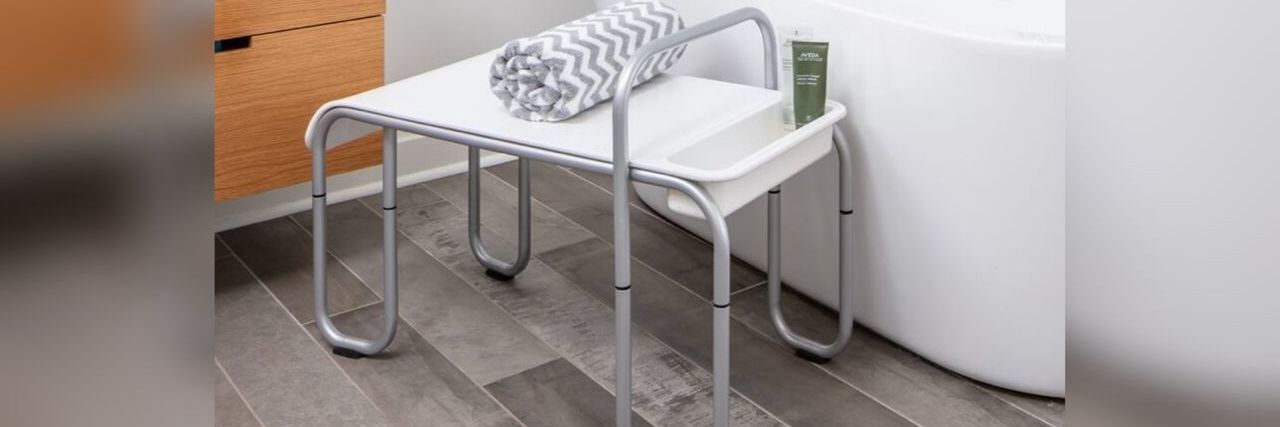Sometimes there’s a fine line between medical equipment and adaptive furniture. A shower or tub bench is a great example — it can be a necessary support if you live with a disability or chronic illness and it takes up permanent residence in your home’s bathroom. The problem is, medical equipment like a shower bench isn’t usually attractive. That’s why Millea Living set out to create adaptive equipment fit for the Ritz.
Millea Living was founded by sisters Jackie Millea and Jennifer Noll. They saw the slew of medical equipment their father used to adapt his home after he became a quadriplegic following a stroke in his 40s. The trouble was most of it wasn’t attractive and, in some cases, the design was lacking. Millea, an interior decorator and architect, knew inclusive design would help make adaptive equipment truly accessible.
“Design can change people’s lives,” Millea told The Mighty. “It can affect the way people feel about themselves, the way that they interact with others, the way that they do welcome new experiences into their lives. I feel like design can enhance all of those things, and therefore, not only your personal self but your relationships in your community.”
The sisters’ idea for a design company that focused on adaptive equipment was born in 2012, but Millea Living didn’t really start gaining momentum until 2016. From there, Millea and Noll built the company and brand into its first tangible product in 2018: the Judith Bench, a redesigned shower and tub bench that looks just as stunning in the bathroom as it does in your hallway without compromising its use as adaptive equipment.
The Judith Bench has a waterfall edge to help facilitate the ability to move from sitting on the bench to standing. Millea said the top of the bench is designed to feel like cashmere, so the bench will not tug on people’s skin, even when it’s wet. The bench is lightweight, has sturdy splayed legs and grippy feet to make sure it’s as sturdy as it is portable. You can also customize your bench, choosing from five frame finish colors and either black and white or patterned seat patterns.
“It’s version 1.0 so I’m sure we’ll be making adaptations as we go along. But we thought quite a bit about how people interact with this piece,” Millea said. “It’s hard to find an attractive bench that can go in the shower could go in the tub.”
However, like a lot of other adaptive equipment on the market for people with disabilities, the Judith Bench currently comes with a steep price tag. The base model costs $745. To add an adjustable frame increases the cost by $100 and some frame or bench finishes will also add another $100. This isn’t affordable for many people with disabilities, who are more likely to qualify as low income compared to people without disabilities. A basic, no-frills shower bench can cost around $35.
Millea and Noll acknowledged they decided to start marketing toward high-end markets as a proof of concept. This is only the first version of the Judith Bench. As they grow, they hope to create more affordable versions of their products.
“We started out smaller towards the designers and architects and the showroom. We eventually would like to get into the long term care facilities, and of course, into people’s homes,” Noll, who runs the business side of Millea Living, told The Mighty. “As we get more into the mass, we’ll be able to make products that will go into all sorts of environments.”
Millea Living’s first expansion includes two new products that are currently available for preorder. The company will offer a wall-mounted version of the Judith Bench, which Millea and Noll especially hope will help people living in long-term care facilities. They’ve also designed a Judith Bed Stability Rail to help those with mobility challenges safely maneuver in and out of bed.
The positive feedback Millea received so far about the Judith Bench and the experiences of her family members drive her desire to increase access for people with disabilities with a diverse set of needs and design preferences. Millea emphasized she hopes their work to incorporate beautiful design into adaptive products inspires other companies to do the same.
“[We] hope that other companies will see what we’re doing and they’ll be adding these kinds of ideas to their life too so there’s a lot of a lot of competition and a lot of choices,” Millea said. “I really, really feel like it’s needed, and people deserve to live in their homes with dignity and independence. And it’s just really important to me that these things are available to people.”
To learn more about Millea Living and its products, visit the company’s website.
Header image via Millea Living’s Instagram

